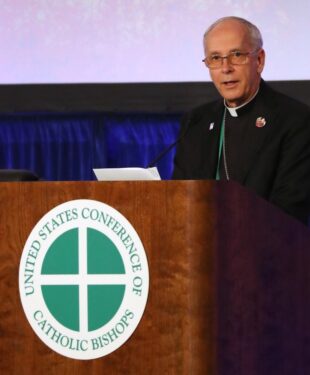
By Kimberley Heatherington
(OSV News) — Bishop Mark J. Seitz of El Paso, Texas, chair of the U.S. Conference of Catholic Bishops’ Committee on Migration, had some grim news for his brother bishops at the USCCB’s 2024 Spring Plenary Assembly in Louisville, Kentucky.
He provided the prelates with an update on the federal Temporary Religious Worker Visa immigration program, which almost 90% of American dioceses rely on to staff their pulpits with foreign-born priests and their ministries with religious sisters, brothers and laypeople. Bishop Seitz had both new developments to share, and a warning.
“During our meeting in November, I shared information with you regarding the challenges we face with the religious worker visa program,” Bishop Seitz said June 14, the second day of public sessions during the June 12-14 assembly. “I also communicated that the (USCCB’s) Department of Migration and Refugee Services would be conducting a national survey of Catholic institutions, to learn more about their reliance on foreign-born religious workers.”
The most important conclusion of that survey?
“Confirmation,” Bishop Seitz emphasized, “that this situation is only expected to worsen with time, if not addressed.”
As OSV News reported in December 2023, the federal government announced in a March 2023 Federal Register notice a procedural change in how it processes green cards for foreign-born religious workers. The practical implication is that — combined with dwindling native vocational numbers and historically high immigration — some foreign-born priests and religious sisters and brothers relied upon by U.S. dioceses may not be able to remain in the country.
“A priest applying for a green card today will be forced to wait an estimated 15 years before a resident visa becomes available to him,” reported Bishop Seitz. “The maximum time allowed in the country for the temporary visa category used by religious workers — known as the R-1 — is five years. This means that the same priest would need to come on three separate R-1 visas — with at least one year in-between, under current regulations — before receiving his green card.”
Bishop Seitz was blunt: “This is simply not sustainable for our ministries — and it is especially devastating for parishes that will be left without a pastor when he is forced to depart the country at the end of his R-1 visa.”
He noted this impact had already been felt in many dioceses, leaving them unable to effectively plan for the future.
The USCCB Committee on Migration, Bishop Seitz said, has been campaigning both Congress and the White House for help.
“Following a series of meetings over the past year with representatives from the White House, the Department of State, and the Department of Homeland Security, we were informed in December that a forthcoming regulation would shorten the time required outside the United States between R-1 visas,” Bishop Seitz said. “If this change is made consistent with our recommendations, a priest or other religious worker would only need to be outside the country for a period of 30 days, every five years, before returning on a new R-1 visa.”
It’s only a partial fix, admitted Bishop Seitz.
“While this does not solve the inordinate wait time for a green card, it would largely nullify the burden posed by the present one-year requirement,” he said. “We are now advocating for the (Biden) administration to prioritize this rule-making, the first step of which is not scheduled to occur until October of this year — and further delay is a concerning possibility.”
“Ultimately,” he stressed, “only Congress can provide a solution that addresses the underlying visa backlog.”
Urging bishops to engage their own congressional delegations, Bishop Seitz noted that the USCCB provides regular updates to Catholic conferences around the country, equipping them with advocacy materials.
“Our collective voice,” Bishop Seitz reminded the gathering, “is critical in this moment.”
Continuing on the topic of immigration, Bishop Seitz said the difficulties confronting both the church and the country extend beyond the Religious Worker Visa program.
“The current public discourse related to immigration — often marked by incendiary comments from political and cultural leaders — has fueled a troubling rise in nativist and anti-immigrant sentiment across our country,” Bishop Seitz noted. “This trend threatens the very fabric of our society, which fares best when immigrants are welcomed, protected, promoted and integrated in an orderly way.”
The church itself, Bishop Seitz observed, has been “scapegoated” for providing aid to immigrants, which some critics have charged is responsible for their surging numbers and related challenges.
With these dynamics in mind, Bishop Seitz announced the USCCB Committee on Migration authorized a parish education program intended to “align U.S. Catholics’ understanding and engagement on this issue with the church’s teachings on migration, which offer a more balanced and nuanced approach — at the heart of which is our respect for the sanctity of human life, the God-given dignity of every person and the well-being of families, native-born and immigrant alike.”
